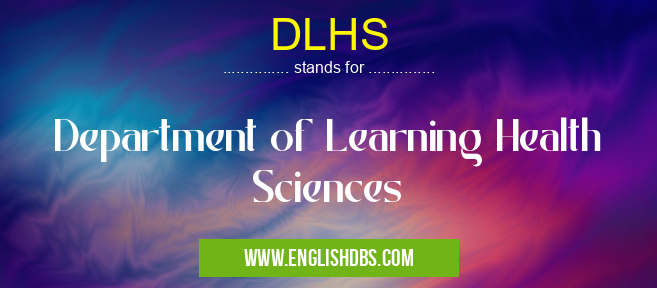What does DLHS mean in HEALTHCARE
DLHS stands for Department of Learning Health Sciences, a department within the field of medical sciences. This department focuses on the study and advancement of learning health systems, which are organizations that improve the quality of healthcare by developing solutions to challenges in modern healthcare delivery. These challenges include using technology to more efficiently and effectively provide care, engaging patients in their own care, and understanding how various social determinants of health can contribute to patient outcomes. The goal of this department is to help modern healthcare practices by providing evidence-based solutions that can be implemented in order to improve patient care.

DLHS meaning in Healthcare in Medical
DLHS mostly used in an acronym Healthcare in Category Medical that means Department of Learning Health Sciences
Shorthand: DLHS,
Full Form: Department of Learning Health Sciences
For more information of "Department of Learning Health Sciences", see the section below.
» Medical » Healthcare
What DLHS Does
The primary purpose of the Department of Learning Health Sciences is to research and develop solutions to challenges that occur within the medical industry. This includes improving patient care through efficient use of technology, understanding how social determinants impact health outcomes, and encouraging collaboration between healthcare providers with various disciplines. Additionally, this team works with physicians, nurses, researchers, administrators, informaticists and other stakeholders in order to achieve these goals. One specific example of how DLHS seeks to improve healthcare delivery is through its implementation of artificial intelligence (AI). AI has the potential to provide valuable insights into patient data that can lead to improved treatments or more effective preventive measures. Furthermore, researches from DLHS have begun exploring ways for AI algorithms to serve as virtual clinicians who are able to provide personalized recommendations for different treatment plans based on individual patient data. Finally, DLHS also consults with healthcare organizations on best practices related to technology adoption and implementation strategies. By examining existing technologies and their effectiveness in improving patient care within a given organization or practice setting, this team assists in streamlining processes in order for staff members to better achieve their desired outcomes while simultaneously offering improved care for patients.
Essential Questions and Answers on Department of Learning Health Sciences in "MEDICAL»HEALTHCARE"
What is Department of Learning Health Sciences (DLHS)?
DLHS is an interdisciplinary department in health sciences that focuses on the study and application of innovative approaches to learning and teaching. It combines insights from neuroscience, psychology, and education science with approaches from engineering, data science and artificial intelligence to design new ways of improving students' learning experiences.
What kind of research does the DLHS do?
The DLHS conducts research in learning health service innovations that utilize technology to enhance users’ overall educational experience. This includes investigations into mobile applications for medical students, personalized health curricula for health professionals, and machine learning models for better patient-provider communication.
Are there any courses offered by the DLHS?
Yes! The DLHS offers a variety of courses focused on the latest developments in applied learning health sciences, such as artificial intelligence for healthcare delivery, tools for developing online education initiatives, and digital patient engagement strategies. Additionally, there are workshops available to help individuals apply their knowledge in practice settings.
What undergraduate degree programs are offered by the DLHS?
The DLHS currently offers Bachelors level degrees in Health Sciences with a concentration in Applied Learning Health Science as well as Master’s level degrees with concentrations in Applied Learning Health Science or Information Systems & Analytics for Healthcare Delivery.
Is it possible to do a PhD at DLHS?
Yes! Students may pursue their PhD studies at the Department of Learning Health Sciences through our Health Sciences doctoral program or our new Transdisciplinary Approach to Digital Innovation (TADI) program - both include very rigorous coursework and dedicated mentoring opportunities within an excellent support system.
What services does the DLHS offer?
The Department of Learning Health Sciences provides consulting services to support digital transformation projects across academic institutions worldwide including Universities and Healthcare systems. These services include curriculum development and training workshops centered around personalized healthcare delivery strategies, AI/machine learning initiatives for healthcare workers, patient engagement solutions and more.
Does the DLHS host collaborative events?
Yes! The Department frequently hosts events such as seminars, networking nights and hackathons which create a platform where industry experts can share their expertise with members of various organizations interested in innovating within the field of healthcare delivery systems.
Is there an online platform I can access if I want to learn more about what the DLHS does?
Yes! We have created an online platform – ‘Learning Health Network’ – which provides access to resources related to cutting-edge topics such as patient engagement projects, IT innovation through artificial intelligence & machine learning and much more - all developed by our research fellows under this program.
Final Words:
In conclusion, DLHS stands for Department of Learning Health Sciences which comprises a team of experts dedicated towards researching solutions that will facilitate better access points towards quality healthcare services. From studying such topics as artificial intelligence algorithms being applied as virtual clinicians providing personalized recommendations based on current patient data all the way up towards consulting hospitals/organizations about best practices when it comes technological adoption/implementation; The goal behind this particular field seeks out ways in which they can streamline processes so both staff members & patients alike receive better quality care/attention while simultaneously improving overall efficiency throughout the entire process itself.
